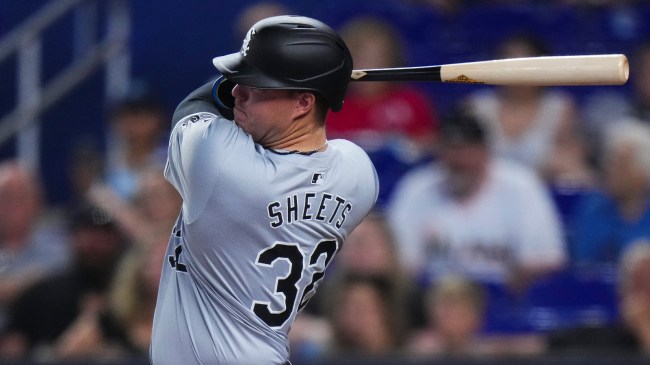
Getty Image
The Chicago White Sox are very, very bad at baseball?
On Monday, the White Sox lost 5-1 to the Oakland Athletics to tie the American League record for consecutive losses in a row at 21.
That’s a particularly brutal stat for Chicago right fielder and first baseman Gavin Sheets, whose father Larry was a member of the 1988 Baltimore Orioles, who also lost 21 games in a row.
Terrificly horrible note from @Mike_Ferrin – both Larry and now Gavin Sheets have been a part of the longest losing streaks between the ‘88 Orioles and now the White Sox.
— Melanie Newman (@MelanieLynneN) August 6, 2024
Now, neither Gavin nor Larry Sheets did much to help their teams out. Gavin is hitting just .213 with 31 RBI and seven home runs. His OPS+ is 82 just another sore spot in an absolutely putrid Sox lineup.
Larry, meanwhile, wasn’t much better. He hit .230 with 47 RBIs and 10 home runs on the year, posting an OPS+ of 83 for the year. So both Sheets’ were well below the level of what you’d expect from a replacement player.
Gavin Sheets Is Just A Small Part Of The Chicago White Sox Losing Streak
Now, it’s not entirely fair to pin the White Sox’s struggles on Sheets. He’s just a symptom of a much larger issue in the form of team owner Jerry Reinsdorf.
Chicago currently has the second-lowest payroll in the league according to Sportrac, and yet Reinsdorf still wants the city of Chicago and state of Illinois to help finance a new ballpark for him.
Thankfully, Illinois governor J.B. Pritzker shut that down.
“I think there’s still a lot of work to be done by the White Sox as well as with members of the General Assembly. But, I will say that I think I’ve been really clear about the fact that the taxpayers dollars are precious,” Pritzker said of the matter. “And, the idea of taking taxpayer dollars and subsidizing the building of a stadium, as opposed to, for example, subsidizing the building of a birthing center, just to give an example, does not seem like the stadium ought to have higher priority.
“Having said that, many of us are sports fans, we all want to see the team succeed. But, these are private businesses. And we’ve seen other teams be able to support their own stadiums privately. That would be ideal here. And I think that’s something that I would encourage, I think the city of Chicago is engaged, as well with them. But I wouldn’t put any number forward. I started out really reluctant. And, unless a case is made that the long-term in the investment yields a long term return for the taxpayers, that we can justify in some way, I haven’t seen that yet.”